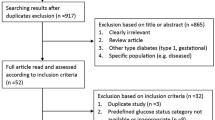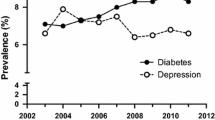Abstract
Aims
Patients with diabetes had a higher risk of developing depressive symptoms. Little is known about the risk of depressive symptoms associated with different glucose metabolism status. We performed a meta-analysis of prospective cohort studies to investigate the risk of depressive symptoms among individuals with impaired glucose metabolism (IGM), newly diagnosed diabetes (NDM), and previously diagnosed diabetes (PDM), compared with those with normal glucose metabolism (NGM), and further examined the influence of diabetes-related comorbidities on the association.
Methods
PubMed and EMBASE were searched for relevant studies through 5 September 2015. The random-effects model was used to calculated overall relative risk (RR) and confidence interval (CI). Three separated meta-analyses were conducted by estimating the risk of depressive symptoms among people with IGM, NDM, and PDM, with NGM as a common reference category. Secondary analyses were conducted to examine whether adjustment for diabetes-related comorbidities affected the association.
Results
Five prospective cohort studies were included in the analyses, with a total of 18,051 participants involved. People with IGM (RR = 1.08, 95 % CI 0.84–1.38) and NDM (RR = 1.07, 95 % CI 0.74–1.55) were not associated with risk of developing depressive symptoms, whereas patients with PDM were associated with a modest increased risk of depressive symptoms (RR = 1.29, 95 % CI 1.03–1.63), after adjustment for demographic/socioeconomic factors. The risk of depressive symptoms associated with PDM was attenuated to be non-significant after pooling RRs that were adjusted for diabetes-related comorbidities.
Conclusions
Our meta-analysis suggested people with PDM, but not IGM or NDM had an increased risk of developing depressive symptoms, and the risk was partially explained by diabetes-related comorbidities. Our findings indicated that routine diabetes care should put more emphasis on psychological problems of diabetic patients with complications.




Similar content being viewed by others
References
Moulton CD, Pickup JC, Ismail K (2015) The link between depression and diabetes: the search for shared mechanisms. Lancet Diabetes Endocrinol 3(6):461–471. doi:10.1016/S2213-8587(15)00134-5
Li C, Ford ES, Strine TW, Mokdad AH (2008) Prevalence of depression among U.S. adults with diabetes: findings from the 2006 behavioral risk factor surveillance system. Diabetes Care 31(1):105–107. doi:10.2337/dc07-1154
Ali S, Stone MA, Peters JL, Davies MJ, Khunti K (2006) The prevalence of co-morbid depression in adults with Type 2 diabetes: a systematic review and meta-analysis. Diabet Med 23(11):1165–1173. doi:10.1111/j.1464-5491.2006.01943.x
Anderson RJ, Freedland KE, Clouse RE, Lustman PJ (2001) The prevalence of comorbid depression in adults with diabetes: a meta-analysis. Diabetes Care 24(6):1069–1078
Schram MT, Baan CA, Pouwer F (2009) Depression and quality of life in patients with diabetes: a systematic review from the European depression in diabetes (EDID) research consortium. Curr Diabetes Rev 5(2):112–119
de Groot M, Anderson R, Freedland KE, Clouse RE, Lustman PJ (2001) Association of depression and diabetes complications: a meta-analysis. Psychosom Med 63(4):619–630
Egede LE, Nietert PJ, Zheng D (2005) Depression and all-cause and coronary heart disease mortality among adults with and without diabetes. Diabetes Care 28(6):1339–1345
Pan A (2010) Bidirectional association depression and type 2 diabetes mellitus in women. Arch Intern Med 170(21):1884. doi:10.1001/archinternmed.2010.356
Mezuk B, Eaton WW, Albrecht S, Golden SH (2008) Depression and type 2 diabetes over the lifespan: a meta-analysis. Diabetes Care 31(12):2383–2390. doi:10.2337/dc08-0985
Golden SH (2007) A review of the evidence for a neuroendocrine link between stress, depression and diabetes mellitus. Curr Diabetes Rev 3(4):252–259
Nouwen A, Nefs G, Caramlau I et al (2011) Prevalence of depression in individuals with impaired glucose metabolism or undiagnosed diabetes: a systematic review and meta-analysis of the European depression in diabetes (EDID) research consortium. Diabetes Care 34(3):752–762. doi:10.2337/dc10-1414
Sun J, Xu M, Lu J, et al (2015) Associations of depression with impaired glucose regulation, newly diagnosed diabetes and previously diagnosed diabetes in Chinese adults. Diabet Med 32(7):935–943
Golden SH, Lazo M, Carnethon M et al (2008) Examining a bidirectional association between depressive symptoms and diabetes. JAMA 299(23):2751–2759. doi:10.1001/jama.299.23.2751
Pieper L, Dirmaier J, Klotsche J et al (2011) Longitudinal associations between depressive symptoms and type 2 diabetes and their impact on mortality in primary care patients. Bundesgesundheitsblatt Gesundheitsforschung Gesundheitsschutz 54(1):98–107. doi:10.1007/s00103-010-1181-1
Icks A, Albers B, Haastert B et al (2013) Risk for high depressive symptoms in diagnosed and previously undetected diabetes: 5-year follow-up results of the Heinz Nixdorf Recall study. PLoS ONE 8(2):e56300. doi:10.1371/journal.pone.0056300
Demakakos P, Zaninotto P, Nouwen A (2014) Is the association between depressive symptoms and glucose metabolism bidirectional? Evidence from the English Longitudinal Study of Ageing. Psychosom Med 76(7):555–561. doi:10.1097/psy.0000000000000082
Okumiya K, Fujisawa M, Sakamoto R et al (2015) Effect of early diagnosis and lifestyle modification on depressive symptoms in community-dwelling elderly adults with glucose intolerance: 5-year longitudinal study. J Am Geriatr Soc 63(2):393–395. doi:10.1111/jgs.13269
Paile-Hyvarinen M, Raikkonen K, Forsen T et al (2007) Depression and its association with diabetes, cardiovascular disease, and birth weight. Ann Med 39(8):634–640. doi:10.1080/07853890701545722
Mantyselka P, Korniloff K, Saaristo T et al (2011) Association of depressive symptoms with impaired glucose regulation, screen-detected, and previously known type 2 diabetes: findings from the Finnish D2D Survey. Diabetes Care 34(1):71–76. doi:10.2337/dc10-1044
Stroup DF, Berlin JA, Morton SC et al (2000) Meta-analysis of observational studies in epidemiology: a proposal for reporting. JAMA 283(15):2008–2012. doi:10.1001/jama.283.15.2008
Stang A (2010) Critical evaluation of the Newcastle-Ottawa scale for the assessment of the quality of nonrandomized studies in meta-analyses. Eur J Epidemiol 25(9):603–605. doi:10.1007/s10654-010-9491-z
Hamer M, Batty GD, Kivimaki M (2011) Haemoglobin A1c, fasting glucose and future risk of elevated depressive symptoms over 2 years of follow-up in the English Longitudinal Study of Ageing. Psychol Med 41(9):1889–1896. doi:10.1017/s0033291711000079
Knol MJ, Heerdink ER, Egberts AC et al (2007) Depressive symptoms in subjects with diagnosed and undiagnosed type 2 diabetes. Psychosom Med 69(4):300–305. doi:10.1097/PSY.0b013e31805f48b9
Aujla N, Abrams KR, Davies MJ, Taub N, Skinner TC, Khunti K (2009) The prevalence of depression in white-European and South-Asian people with impaired glucose regulation and screen-detected type 2 diabetes mellitus. PLoS ONE 4(11):e7755. doi:10.1371/journal.pone.0007755
Nouwen A, Winkley K, Twisk J et al (2010) Type 2 diabetes mellitus as a risk factor for the onset of depression: a systematic review and meta-analysis. Diabetologia 53(12):2480–2486. doi:10.1007/s00125-010-1874-x
Rotella F, Mannucci E (2013) Diabetes mellitus as a risk factor for depression. A meta-analysis of longitudinal studies. Diabetes Res Clin Pract 99(2):98–104. doi:10.1016/j.diabres.2012.11.022
Palinkas LA, Lee PP, Barrett-Connor E (2004) A prospective study of Type 2 diabetes and depressive symptoms in the elderly: the Rancho Bernardo Study. Diabet Med 21(11):1185–1191. doi:10.1111/j.1464-5491.2004.01315.x
Chang HH, Chi MH, Lee IH et al (2013) The change of insulin levels after six weeks antidepressant use in drug-naïve major depressive patients. J Affect Disord 150(2):295–299. doi:10.1016/j.jad.2013.04.008
de Jonge P, Roy JF, Saz P, Marcos G, Lobo A (2006) Prevalent and incident depression in community-dwelling elderly persons with diabetes mellitus: results from the ZARADEMP project. Diabetologia 49(11):2627–2633. doi:10.1007/s00125-006-0442-x
Adriaanse MC, Dekker JM, Heine RJ et al (2008) Symptoms of depression in people with impaired glucose metabolism or Type 2 diabetes mellitus: the Hoorn Study. Diabet Med 25(7):843–849. doi:10.1111/j.1464-5491.2008.02464.x
Koponen H, Jokelainen J, Keinänen-Kiukaanniemi S, Kumpusalo E, Vanhala M (2008) Metabolic syndrome predisposes to depressive symptoms: a population-based 7-year follow-up study. J Clin Psychiatry 69(2):178–182
Tabák AG, Akbaraly TN, Batty GD, Kivimäki M (2014) Depression and type 2 diabetes: A causal association? Lancet Diabetes Endocrinol 2(3):236–245. doi:10.1016/s2213-8587(13)70139-6
Roos C, Lidfeldt J, Agardh C-D et al (2007) Insulin resistance and self-rated symptoms of depression in Swedish women with risk factors for diabetes: the Women’s Health in the Lund Area study. Metab Clin Exp 56(6):825–829. doi:10.1016/j.metabol.2007.01.013
Trento M, Charrier L, Salassa M et al (2015) Depression, anxiety and cognitive function in patients with type 2 diabetes: an 8-year prospective observational study. Acta Diabetol. doi:10.1007/s00592-015-0806-0
Author information
Authors and Affiliations
Corresponding author
Ethics declarations
Conflict of interest
The authors declare that they have no conflict of interest.
Ethical disclosure
All included studies have been reviewed by the appropriate ethics committee and have therefore been performed in accordance with the ethical standards.
Human and animal rights
This article does not contain any studies with human or animal subjects performed by the any of the authors.
Informed consent
All persons gave their informed consent prior to their inclusion in the studies.
Additional information
Managed by Massimo Federici.
Electronic supplementary material
Below is the link to the electronic supplementary material.
Rights and permissions
About this article
Cite this article
Tong, A., Wang, X., Li, F. et al. Risk of depressive symptoms associated with impaired glucose metabolism, newly diagnosed diabetes, and previously diagnosed diabetes: a meta-analysis of prospective cohort studies. Acta Diabetol 53, 589–598 (2016). https://doi.org/10.1007/s00592-016-0845-1
Received:
Accepted:
Published:
Issue Date:
DOI: https://doi.org/10.1007/s00592-016-0845-1




